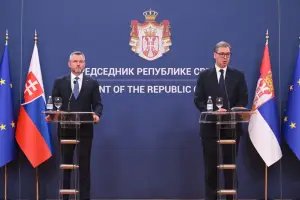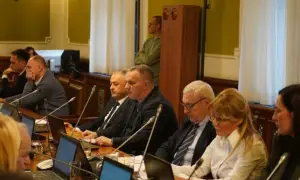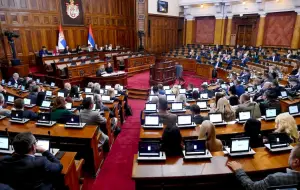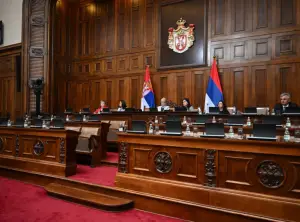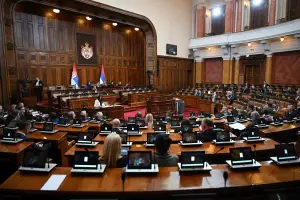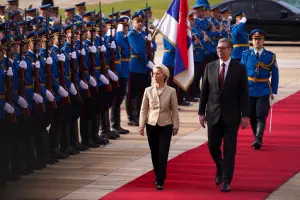Q:
A:
Parliament ratifies CEFTA Agreement, adopts amendments to laws on citizenship, tobacco
Belgrade,
24 September 2007
Serbian parliament members adopted today amendments to the Law on citizenship, which will enable all Serbs living abroad to get Serbian citizenship, passed amendments to the Law on tobacco and ratified the CEFTA agreement.
The condition for getting Serbian citizenship, without renouncing the citizenship of the country they live in, is to be over 18 years of age, able to work and to sign the statement that they consider Serbia their country.
Montenegrin citizens may also get Serbian citizenship if on June 3, 2006, they had a registered place of abode on Serbia’s territory and if they submit an application and a written statement saying that they consider themselves Serbian citizens.
Montenegrin citizens who had no registered place of abode when Montenegro became independent will be able to get Serbian citizenship under more flexible conditions which are valid for all citizens of the former Socialist Federal Republic of Yugoslavia.
Members of other peoples and ethnic communities may also apply for Serbian citizenship within two years from the day the law is enforced.
Amendments to the Law on citizenship were prepared in line with the concept whose solutions should enable the processes of granting and revoking Serbian citizenship, the continuity of citizenship and the prevention of apatride.
Serbian parliament also ratified the CEFTA agreement on free trade in southeastern Europe which envisages the creation of a free trade zone by December 31, 2010.
CEFTA envisages the abolishment of customs restrictions for industrial and agricultural products in countries in the region by 2010 at the latest.
The agreement also envisages liberalisation of public procurements and more forceful attracting of foreign investments. The chances for entering EU markets under preferential terms will also increase.
On December 19, 2006, the CEFTA agreement was signed by Albania, Bosnia and Herzegovina, Croatia, Macedonia, Moldova, Serbia, Montenegro and UNMIK.
Parliament also adopted amendments to the Law on tobacco which put an end to the previously compulsory tobacco-purchase system and bring excise on home and imported tobacco to the same level.
The Law on tobacco has thus been harmonised with regulations of the EU and the World Trade Organisation and the CEFTA agreement.
The law aims at enabling equal and stable conditions for developing domestic tobacco industry, increasing productivity and exporting domestic processed tobacco and tobacco products.
Serbian Parliament adopted the Law on travelling documents, thus introducing new Serbian passports. Old Yugoslav passports, which are still valid, will be replaced from March 1, 2008.
The law envisages that by end-2008 all old passports be replaced.
New passports will be issued for the period of ten years and will be have alphanumeric code, as well as protective elements.
Names of people belonging to national minorities will be written in their own language.
Apart with laws on asylum, state border and foreigners, this law is one of the priorities in Serbia’s EU integration process.
Parliament also passed the Law on the adoption of the Kyoto Protocol with the UN framework convention on climate change.
The document aims at reducing the emission of harmful gases which cause the glasshouse effect.
The Protocol obliges developed signatory countries to reduce the emission of harmful gases by 5% by the year 2012, though developing countries, such as Serbia, are not under such an obligation.
Serbian Parliament appointed the Council of the State Auditing Institution (DRI), an important anti-corruption body which controls all direct and indirect state budget beneficiaries.
Radoslav Sretenovic was elected DRI President and Ljubica Nedeljkovic Vice-President.
Zoran Tamas, Ljiljana Dmitrovic-Saponja and Natalija Catovic were elected members of the DRI.
Parliament adopted amendments to the Law on preventing violence and violent behaviour at sporting events which introduce stricter prison sentences for offenders.
Prison sentences for hooligans who cause an incident will be between six months and five years.
Prison sentences for a group of hooligans which causes an incident will be from one to eight years.
Montenegrin citizens may also get Serbian citizenship if on June 3, 2006, they had a registered place of abode on Serbia’s territory and if they submit an application and a written statement saying that they consider themselves Serbian citizens.
Montenegrin citizens who had no registered place of abode when Montenegro became independent will be able to get Serbian citizenship under more flexible conditions which are valid for all citizens of the former Socialist Federal Republic of Yugoslavia.
Members of other peoples and ethnic communities may also apply for Serbian citizenship within two years from the day the law is enforced.
Amendments to the Law on citizenship were prepared in line with the concept whose solutions should enable the processes of granting and revoking Serbian citizenship, the continuity of citizenship and the prevention of apatride.
Serbian parliament also ratified the CEFTA agreement on free trade in southeastern Europe which envisages the creation of a free trade zone by December 31, 2010.
CEFTA envisages the abolishment of customs restrictions for industrial and agricultural products in countries in the region by 2010 at the latest.
The agreement also envisages liberalisation of public procurements and more forceful attracting of foreign investments. The chances for entering EU markets under preferential terms will also increase.
On December 19, 2006, the CEFTA agreement was signed by Albania, Bosnia and Herzegovina, Croatia, Macedonia, Moldova, Serbia, Montenegro and UNMIK.
Parliament also adopted amendments to the Law on tobacco which put an end to the previously compulsory tobacco-purchase system and bring excise on home and imported tobacco to the same level.
The Law on tobacco has thus been harmonised with regulations of the EU and the World Trade Organisation and the CEFTA agreement.
The law aims at enabling equal and stable conditions for developing domestic tobacco industry, increasing productivity and exporting domestic processed tobacco and tobacco products.
Serbian Parliament adopted the Law on travelling documents, thus introducing new Serbian passports. Old Yugoslav passports, which are still valid, will be replaced from March 1, 2008.
The law envisages that by end-2008 all old passports be replaced.
New passports will be issued for the period of ten years and will be have alphanumeric code, as well as protective elements.
Names of people belonging to national minorities will be written in their own language.
Apart with laws on asylum, state border and foreigners, this law is one of the priorities in Serbia’s EU integration process.
Parliament also passed the Law on the adoption of the Kyoto Protocol with the UN framework convention on climate change.
The document aims at reducing the emission of harmful gases which cause the glasshouse effect.
The Protocol obliges developed signatory countries to reduce the emission of harmful gases by 5% by the year 2012, though developing countries, such as Serbia, are not under such an obligation.
Serbian Parliament appointed the Council of the State Auditing Institution (DRI), an important anti-corruption body which controls all direct and indirect state budget beneficiaries.
Radoslav Sretenovic was elected DRI President and Ljubica Nedeljkovic Vice-President.
Zoran Tamas, Ljiljana Dmitrovic-Saponja and Natalija Catovic were elected members of the DRI.
Parliament adopted amendments to the Law on preventing violence and violent behaviour at sporting events which introduce stricter prison sentences for offenders.
Prison sentences for hooligans who cause an incident will be between six months and five years.
Prison sentences for a group of hooligans which causes an incident will be from one to eight years.


